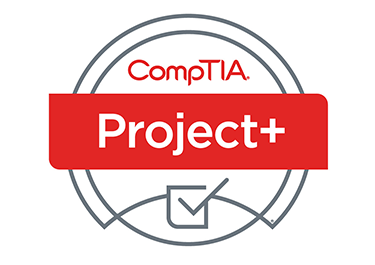 Katie Craig was taking on more responsibility in more different areas than she ever had before at Van Winkle Law Firm, and given the important role she already played there, that was no small feat.
Katie Craig was taking on more responsibility in more different areas than she ever had before at Van Winkle Law Firm, and given the important role she already played there, that was no small feat.
For more than a decade, Craig had been at the leadership level in the firm’s IT department, building her skills in the office and by picking up CompTIA certifications while attending Western Governors University (WGU) on the side. But one CompTIA certification Craig earned at WGU was slightly different than the other certs she had on her resume, and it opened up professional opportunities that she had never expected to explore. That certification was CompTIA Project+. Along with new responsibilities, it brought her a new title. While remaining in charge of IT, she also took on the role of director of operations in human resources.
“In a lot of ways the Project+ certification was that bridge for me, for moving from IT into some of these other roles within my organization,” Craig said. “Because my supervisor understood what CompTIA was, he felt like that applied some trust. He understood the brand, and with the brand there was an inference of trust with it, like, ‘OK, if CompTIA says she can handle projects, let’s give her projects.’”
With the confidence to take on projects outside of her main area of expertise, and her long-time boss’s confidence that she could see them through, Craig took on a number of projects far beyond the computer screen she had built her career around. She organized a one-hundred-employee health fair that occurred simultaneously in three different locations. She coordinated a Halloween-themed community outreach blood drive, complete with staff dressed in vampire costumes. She even managed the replacement of the facade of one of the firm’s one-hundred-year-old buildings. Though each undertaking couldn’t be more different from the next in terms of needs, staff requirements and final product, they all had one thing in common – they were all projects. CompTIA Project+ equipped Craig to see the common thread and use that as the basis for smart, organized strategies.
“Knowing what needed to happen in order [to get] the best results really helped me to have successful projects,” Craig said. “Knowing what to do and how to do it right from start to finish – whatever the project, whether we’re talking about a blood drive or a brand new privacy training protocol – meant a better result for the organization.”
Through an association with the CompTIA Academy Partnership Program, which provides educational institutions with the tools to set educators and students up for certification success, WGU has implemented CompTIA certifications throughout its extensive catalog of professionally geared programs. The school’s competency-based education model, which promotes industry certification as the culmination of self-paced remote learning, prepares students to thrive in their careers by using certifications, where available, as final exams. WGU students earn their Project+ certification as part of the Business of IT – Project Management course, which WGU offers both in its College of Business and College of IT.
Candice Allen, course mentor, has seen both business-minded and tech-focused students succeed with CompTIA Project+, and with good reason.
“We’re seeing that people are benefiting from it because there are projects everywhere,” Allen said. “It’s not just in IT. We see it in the healthcare field, we see it in business. People are seeing it all around them and that’s going to be ever evolving.”
In her time teaching the certification, Allen has seen people with different ranges of project experience – as well as different professional backgrounds – benefit from the certification. Some of her students have had job roles adjacent to project management but haven’t taken an active role. Others have been looking to expand their responsibilities. And some, like Craig, have had the CompTIA Project+ certification push them to further explore other project management opportunities. Like the IT world, project management has a vocabulary all its own – one for which CompTIA Project+ confirms a mastery.
“It shows the employer that [a candidate has] a good understanding of what a successful project will entail,” Allen said. “So they will know the terminology, they will know the structure and they will know how to be participants in it and supportive of it. It makes [students] more competitive in the market.”
The class, and the cert, have inspired a great deal of positive student feedback, and that has been paralleled by industry enthusiasm. Software Information and Industry Association has listed the Business of IT – Project Management course as a 2016 finalist for its highly regarded CODiE award.
And in Craig’s case, her enthusiasm for WGU and the certs it teaches inspired her to take on a new professional project of her own. As a student, she was so moved by WGU’s offering of affordable e-learning with industry-standard certifications that last year she joined the staff of WGU as a course mentor. Now, working alongside Allen mentoring the Business of IT course, she and a team of three support around 4,000 students, setting them up for success in IT, business or beyond – because CompTIA Project+ is important everywhere.
“One of the things that is very cool about the Project+ cert is that broad introduction to the theory of project management, because it applies to every project you work on,” Craig said. “People think of [CompTIA] as an IT brand, but project management applies to everything.”
Matthew Stern is a freelance writer based in Chicago who covers information technology, retail and various other topics and industries.

